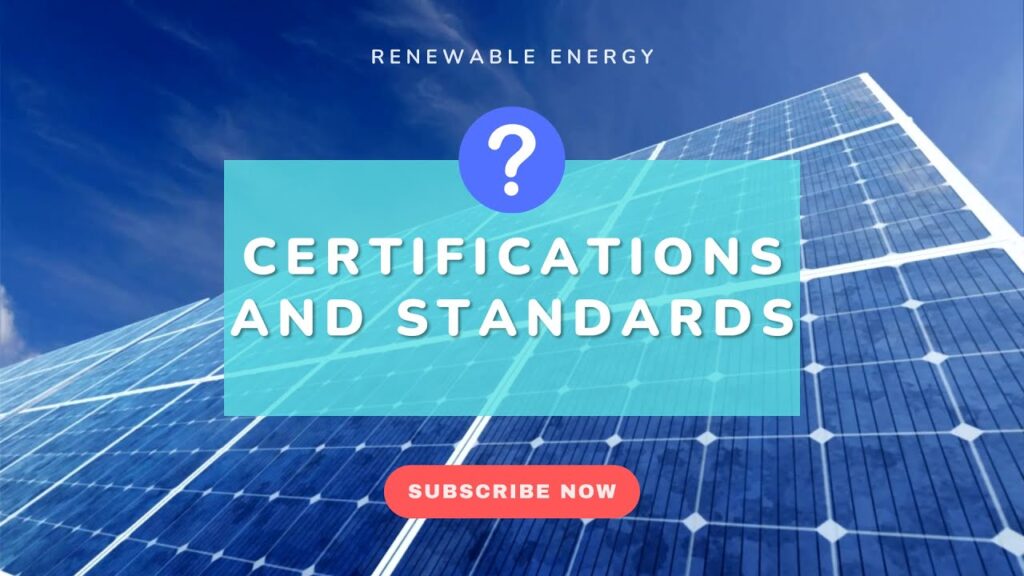Renewable energy refers to energy sources that are naturally replenished and have a minimal impact on the environment. These sources include solar, wind, hydropower, biomass, and geothermal energy. As the world increases its focus on sustainability and combating climate change, understanding renewable energy certifications and standards becomes crucial. These certifications and standards play a vital role in verifying that renewable energy projects adhere to specific guidelines, promoting transparency and accountability. They provide proof that energy was produced using renewable resources and enable individuals and businesses to support clean energy projects. By exploring major certifications, global standards, and discussing challenges and future developments in the renewable energy sector, this guide on Driver Mojo aims to provide valuable insights into the world of renewable energy certifications and standards, steering us towards a more sustainable future. A Guide to Renewable Energy Certifications and Standards

Introduction
Welcome to Driver Mojo! In this video, we will be exploring the world of renewable energy certifications and standards. As we move towards a more sustainable future, it is crucial to understand the importance of these certifications. Join us on this enlightening journey as we break down major certifications, explore global standards, and discuss the challenges and future developments in the renewable energy sector.
The Need for Certifications and Standards
Before we delve into the certifications and standards themselves, let’s discuss why they are essential. As the world increasingly turns to renewable energy sources, it is important to ensure that these sources are not only environmentally friendly but also meet certain quality and performance standards. Certifications and standards play a vital role in verifying that renewable energy projects adhere to specific guidelines, promoting transparency and accountability. By having certifications and standards in place, we can ensure that renewable energy sources are reliable and trustworthy.
Major Renewable Energy Certifications
Now that we understand the need for certifications and standards, let’s delve into some major certifications in detail.
Renewable Energy Certificate (REC)
The Renewable Energy Certificate (REC) is a market-based instrument that certifies the environmental attributes of electricity generated from renewable sources. It provides proof that a certain amount of energy was produced using renewable resources and enables individuals and businesses to support clean energy projects. RECs are a way for consumers to ensure that the electricity they are using is truly sustainable and helps contribute to a greener future.
Green-e Certification
The Green-e certification program focuses on verifying and certifying renewable energy products and projects. It covers various renewable sources, including solar, wind, and biomass. Green-e provides consumers with a reliable way to identify and support genuinely clean energy options in the marketplace. By choosing Green-e certified products, consumers can make a positive impact and support renewable energy development.
LEED (Leadership in Energy and Environmental Design)
LEED, or Leadership in Energy and Environmental Design, is a certification program that extends beyond buildings to cover renewable energy systems. LEED-certified projects meet high standards for sustainability and environmental performance. LEED is widely recognized in the construction and energy sectors and has been instrumental in driving the adoption of eco-friendly practices. By obtaining LEED certification, projects demonstrate their commitment to sustainable development.
Global Renewable Energy Standards
Now let’s explore global standards in the renewable energy sector.
International Renewable Energy Certificate Standard (I-REC)
The International Renewable Energy Certificate Standard (I-REC) is a global standard for documenting and tracking renewable energy consumption. It ensures that the environmental attributes of renewable energy are accurately disclosed and can be traded internationally. This standard facilitates the global recognition of renewable energy attributes, promoting consistency and transparency in the market. By adhering to the I-REC standard, renewable energy projects can gain recognition and contribute to the global transition towards clean energy.
ISO 14001 (Environmental Management System)
The ISO 14000 series, particularly ISO 14001, focuses on Environmental Management Systems (EMS). It helps organizations address energy use and efficiency within a broader framework of environmental responsibility. ISO 14001 is applicable to various industries and emphasizes a holistic approach to sustainable practices. By implementing an EMS in accordance with ISO 14001, organizations can effectively manage their environmental impact and improve their overall sustainability performance.

Challenges and Future Developments
While certifications and standards have come a long way in promoting renewable energy, challenges still persist. One common hurdle is the lack of harmonization among different standards, leading to confusion in the industry. Efforts are being made to streamline and harmonize these standards for better global adoption. Additionally, there is a growing need for more specific standards as technology evolves and new forms of renewable energy emerge. As we look to the future, we can expect advancements in technology and an evolution of existing standards to better address these challenges. The industry will continue to innovate and adapt to new challenges, ensuring that certifications and standards remain relevant and effective in promoting sustainability.
Conclusion
In conclusion, understanding renewable energy certifications and standards is crucial for building a sustainable future. Whether you are an individual looking to support clean energy or a business seeking to enhance its environmental performance, knowing and recognizing these certifications is a step in the right direction. By choosing certified renewable energy products and supporting projects that adhere to high standards, we can all contribute to a greener and more sustainable world. Thank you for watching, and we hope you found this guide enlightening. Don’t forget to like, share, and subscribe for more content on sustainable living and renewable energy.




